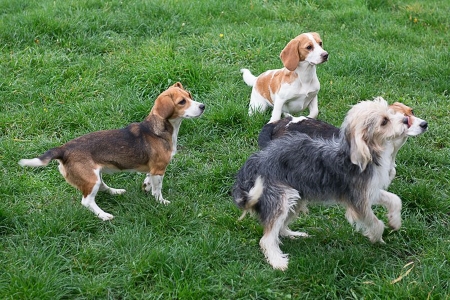MRes - Assisted Reproductive Technology for expediting canine Duchenne Muscular Dystrophy (DMD) translational research
Supervisors: Dr Ali Fouladi-Nashta and Professor Richard Piercy
Department: Comparative Biomedical Sciences
Project Details

The overall aim of this project is to optimize culture conditions for in vitro maturation (IVM) condition of dog oocytes. We have a well-established culture system for IVM of oocytes from animal species. We propose to utilize advanced assisted reproductive technologies (ART) in order to expedite dog models of Duchenne Muscular Dystrophy (DMD). If successful, this work will transform our translational research program and will be applicable to all groups working with dogs for DMD research and for other X-linked disorders.
In contrast to other mammals, canine oocytes are ovulated in an immature state. They develop to metaphase II in the oviduct 48-72h after ovulation. Co-culture of canine oocytes with oviductal epithelial cells (OVECs) has improved the maturation rate of the oocytes. It has been suggested that the components of micro-vesicles (MVs) produced by the OVECs and exosomes (Exo) secreted by the oocytes are critical factors involved in inducing nuclear maturation in canine. You will carry out experiments to clarify the beneficial impact of selected compounds on dog oocyte maturation and embryo production. You will also extract Exo from the spent co-culture medium and carry out experiments to determine the optimal dose, as well as clarify the uptake of MVs by the oocytes through fluorescent tagging of the extracted Exos. Depending on the project progression, you may be able to fertilize the matured oocytes through intracytoplasmic sperm injection.
This project will provide extensive training and hands-on practice in a range of ARTs. It will be suitable for candidates seeking a working career in animal or human embryology. You will gain expertise in a range of laboratory research techniques as well as experimental design, data analysis, and scientific writing.
References
-
Lee et al (2021) Canine oviductal exosomes improve oocyte development via EGFR/MAPK signaling pathway. Reproduction 160: 613–625.
-
Salavati et al (2012) Effects of oxygen concentration on in vitro maturation of canine oocytes in a chemically defined serum-free media. Reproduction 144: 547-56.
-
Salavati et al (2013) Influence of caffeine pretreatment on biphasic in vitro maturation of dog oocytes. Theriogenology 80:784-92.
Requirements
Essential:
- Must meet our standard MRes entry requirements.
- BSc in Biological / Animal/ Bioveterinary Sciences
- Permission and willingness to drive in the UK to collect samples from Veterinary clinic
Desirable:
- Practical laboratory experience in working with oocyte or embryos
This project will be full-time (12 months) commencing in October 2023. It will be based at RVC's Hawkshead campus.
Funding
This project is partially funded: e.g. the lab will be covering the project costs, with the MRes student expected to meet the course fees and their living expenses.
You can find information on fees and funding online. A postgraduate master's loan may be available to help cover costs.
How to Apply
For more information on the application process and English Language requirements see How to Apply.
Deadline: 30th July 2023
We welcome informal enquiries - these should be directed to afouladi@rvc.ac.uk
Interview date and location: TBC (August 2023)
